What effect do keyboard modifications have?
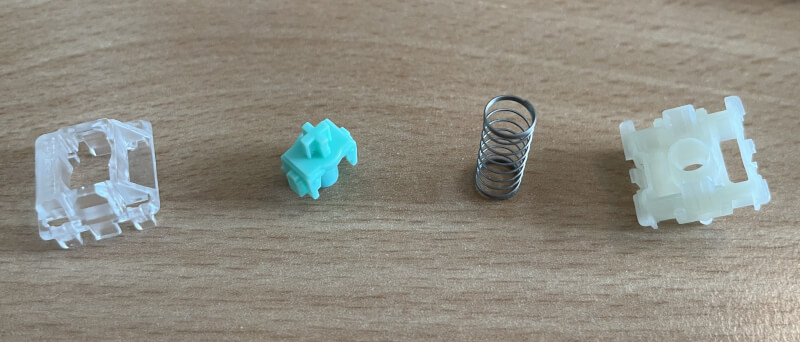
To limit my investigation, I have chosen to focus on three things; case material, keycaps material and switch lubing. These are the three things that are easiest to jump into when it comes to keyboard mods. My baseline is my Wooting 60 HE, which Wooting has designed with mods in mind and has therefore chosen to use the unofficial GH 60 standard for key layout and not least screw layout. Wooting has even been kind enough to send me their Lube set and their toolkit.
My baseline is a completely standard Wooting 60 HE with ABS keycaps. You can find our test of the Wooting 60 HE here .
Wooing case, ABS keycaps 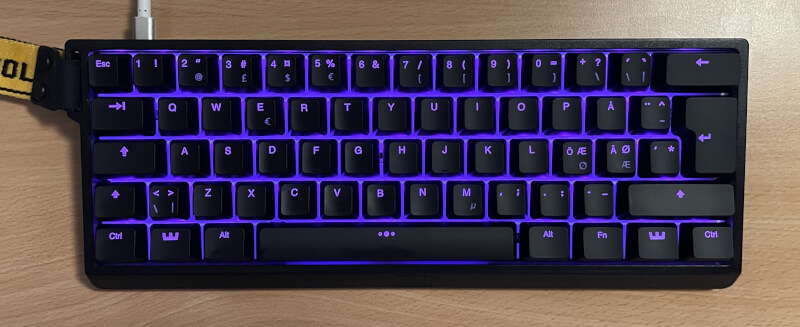
Setup
- Wooting 60 HE case - ABS
- Wooing keycaps - ABS
- Standard Gateron Lekker switches
- Stabilizers lubed from the factory
LISTEN TO SOUND TEST OF THIS SET-UP HERE.
Feeling
The Wooting 60 HE is a relatively good keyboard out of the box, so the key feel is on par with other of the better linear, more mainstream mechanical keyboards. It is comparable to my Xtrfy K5 with MX Red switches.
I will probably never be a fan of ABS keycaps. They are very smooth and have almost no texture. At the same time, you can clearly feel that the switches are not lubed by the factory, so that all unevenness is transferred directly to the fingers. Again, it's no worse than many other gaming keyboards, but once you try lubed switches, it becomes very obvious when the switches are not lubed.
Sound
Wooting 60 HE is definitely not the worst keyboard I've tried with ABS keycaps and ABS case. In fact, it's one of the better ones, but it still suffers from an underlying high-pitch tone that isn't particularly pleasant to listen to. It helps that Wooting has lubricated the stabilizers themselves, so that the space bar and the other slightly larger keys do not rattle and make noise as much as they often do on stock mechanical gaming keyboards. However, it is still relatively "clacky"
Wooing case, PBT keycaps 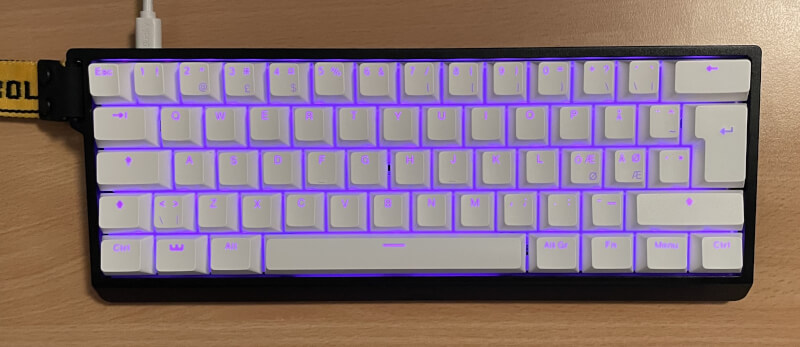
Setup
- Wooting 60 HE case - ABS
- Wooting keycaps - PBT
- Standard Gateron Lekker switches
- Stabilizers lubed from the factory
LISTEN TO SOUND TEST OF THIS SET-UP HERE.
Feeling
To start with, I have only changed the keycaps to PBT keycaps from Wooting. They are double-shot, that is, they are cast in two layers, a transparent inner layer and a white outer layer. Unlike ABS keycaps, the PBT version has a really pleasant surface which is textured without being rough. The unevenness in the un-lubed switches is also not as obvious as with ABS keycaps.
Sound
The worst high-pitch tone is clearly toned down just by changing the keycaps to PBT and the key sound is somewhat less "clacky" than with ABS keycaps. However, the sound from the space bar has become more distinct, which is just a sign that ABS and PBT have different acoustic properties. On the other hand, the spacebar is no more unpleasant to listen to, the sound has just become clearer and at the same time a little deeper.
Aluminum case, PBT keycaps
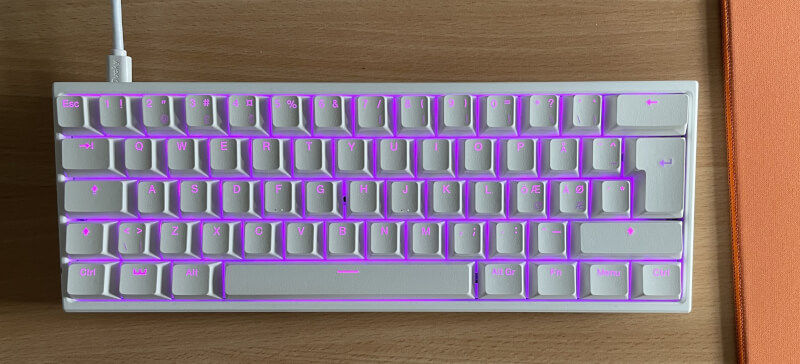
Setup
- Case from Aliexpress, CNC aluminum
- Wooting keycaps - PBT
- Standard Gateron Lekker switches
- Stabilizers lubed from the factory
LISTEN TO SOUND TEST OF THIS SET-UP HERE.
Feeling
The key feel itself has not changed much from ABS to aluminum case, however you can feel that aluminum does not give in any way, where ABS can after all give a little. The keyboard definitely feels a little more "firm" to type on.
Sound
The aluminum box gives a different acoustic to the ABS box, so the key sound has now become a little louder than in the ABS box and the tone has also changed slightly, so that it is now hardly as deep.
Alu case, PBT keycaps, lubed switches
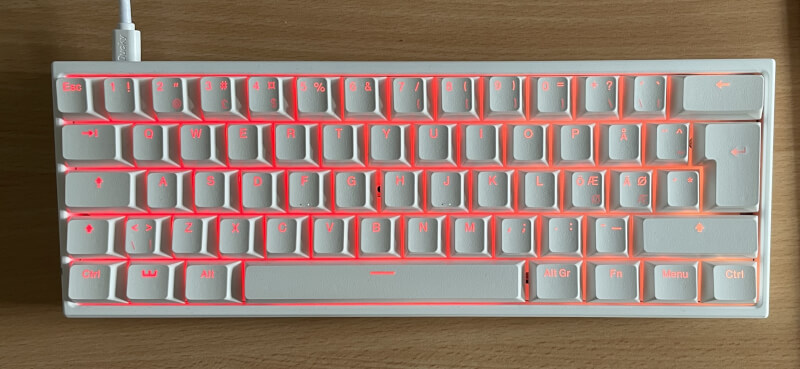
Setup
- Case from Aliexpress, CNC aluminum
- Wooting keycaps - PBT
- Lubed Gateron Nice switches
- Stabilizers cleaned and re-lubed
LISTEN TO SOUND TEST OF THIS SET-UP HERE.
Feeling
The key feel is now much more "smooth", the unevenness you could feel from the switches is almost gone and the keyboard has become more comfortable to type on, for lack of a better word it feels muted, but still responsive.
Sound
The key sound is now more muted again, it has also become deeper. In particular, the space bar clarifies the difference between lubed and non-lubed switches. It doesn't seem that the stabilizers have changed the sound, but if nothing else the feel is optimized after a slightly more precise application. It is undoubtedly the most comfortable and least noisy version of the keyboard.
Conclusion
There is no doubt that material selection has a big effect on both how a keyboard feels to type on, but also on how it sounds. The general consensus among keyboard enthusiasts is that PBT keycaps are clearly superior to ABS keycaps and my results certainly back up that claim. There are many different materials for cases, but the two most common are probably plastic, often ABS, and aluminium. My experience, with or without testing, is that aluminum definitely feels better, both more stable because it is heavier, but it also has more pleasant sound characteristics in my opinion. However, it is also significantly more expensive than plastic cases, just as PBT keycaps are often more expensive than ABS keycaps. Regardless of which material you choose, it really pays to lube switches and stabilizers. It's arguably what has the biggest effect on feel and, if done properly, it's purely an upgrade to any keyboard that allows it. If you are missing a guide for that, Wooting has created one on their YouTube channel: How to LUBE your Wooting Keyboard . It is of course specific to the Wooting 60 HE, but the method they use is the same for all MX-style mechanical switches, there are just fewer parts in Lekker switches than in regular mechanical switches. The most important thing to be aware of is not to apply too much lubricant; less is more. If you have a hotswap keyboard and haven't tried yet, it is highly recommended to spend the few hours it takes to lube switches at home. A complete set with tools and lubrication can be purchased for DKK 2-300.
Latest keyboard
-
27 Febkeyboard
-
18 Febkeyboard
Logitech Pro X TKL Rapid
-
02 Deckeyboard
Glorious GMMK 3 Pro HE
-
12 Novkeyboard
Glorious GMMK 3 HE
-
05 Novkeyboard
Logitech POP Icon Combo
-
01 Novkeyboard
Corsair introduces the K70 PRO TKL
-
24 Octkeyboard
Logitech G915 X Lightspeed TKL
-
21 Octkeyboard
ASUS ROG Falchion Ace HFX
Most read keyboard
Latest keyboard
-
27 Febkeyboard
Corsair K70 Pro TKL
-
18 Febkeyboard
Logitech Pro X TKL Rapid
-
02 Deckeyboard
Glorious GMMK 3 Pro HE
-
12 Novkeyboard
Glorious GMMK 3 HE
-
05 Novkeyboard
Logitech POP Icon Combo
-
01 Novkeyboard
Corsair introduces the K70 PRO TKL
-
24 Octkeyboard
Logitech G915 X Lightspeed TKL
-
21 Octkeyboard
ASUS ROG Falchion Ace HFX






